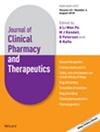Comparison of Efficacy and Safety of First-Line Chemoimmunotherapy in Advanced Esophageal Squamous Cell Carcinoma: A Systematic Review and Network Meta-Analysis
IF 2.1
4区 医学
Q3 PHARMACOLOGY & PHARMACY
引用次数: 0
Abstract
Background. Chemoimmunotherapy has become the first-line treatment for advanced esophageal squamous cell carcinoma (ESCC). We aimed to compare the efficacy and toxicity of different chemoimmunotherapy combinations to determine the optimal treatment option. Methods. PubMed, Web of Science, Cochrane Library, Embase, and abstracts of recent relevant meetings were searched to identify phase III randomized controlled trials (RCTs) of first-line programmed cell death-1 (PD-1)/its receptor (PD-L1) inhibitors plus chemotherapy for ESCC up to July 2022. A network meta-analysis (NMA) following Bayesian approaches was conducted in R software. Result. Our study included six RCTs and 3,611 patients. According to the NMA, toripalimab plus chemotherapy ranked first to prolong overall survival (OS). Sintilimab plus chemotherapy and camrelizumab plus chemotherapy consistently yielded the greatest benefits regarding progression-free survival (PFS). The maximal complete response rate (CRR) and objective response rate (ORR) were achieved with nivolumab plus chemotherapy. Tislelizumab plus chemotherapy attained the highest likelihood of achieving a disease control rate (DCR). The addition of immunotherapy to chemotherapy was associated with improved survival and increased adverse events. Subgroup analysis revealed that patients with PD-L1 tumor positive score (TPS) ≥10% showed a better OS than those with lower values when undergoing first-line chemoimmunotherapy. Anti-PD-1 inhibitor with platinum plus paclitaxel (TP) regimen showed a superior PFS benefit over anti-PD-1 inhibitor with platinum plus fluorouracil (FP) regimen. Conclusion. The NMA analysis suggested that sintilimab plus chemotherapy was the preferred regimen for treatment-naive advanced ESCC patients with the best balance between efficacy and safety. Anti-PD-1 inhibitors with the TP regimen were associated with more favorable PFS than those with the FP regimen.晚期食管鳞状细胞癌一线化学免疫治疗的疗效和安全性比较:系统评价和网络荟萃分析
背景化学免疫疗法已成为晚期食管鳞状细胞癌(ESCC)的一线治疗方法。我们旨在比较不同化学免疫疗法组合的疗效和毒性,以确定最佳治疗方案。方法。检索PubMed、Web of Science、Cochrane Library、Embase和最近相关会议的摘要,以确定截至2022年7月的一线程序性细胞死亡-1(PD-1)/其受体(PD-L1)抑制剂加化疗治疗ESCC的III期随机对照试验(RCT)。采用贝叶斯方法在R软件中进行网络荟萃分析(NMA)。后果我们的研究包括6项随机对照试验和3611名患者。根据NMA,托里帕利单抗加化疗在延长总生存期(OS)方面排名第一。辛蒂利单抗联合化疗和卡雷珠单抗联合化疗在无进展生存期(PFS)方面始终产生最大的益处。nivolumab联合化疗达到最大完全缓解率(CRR)和客观缓解率(ORR)。Tislelizumab加化疗达到疾病控制率(DCR)的可能性最高。在化疗的基础上增加免疫疗法与生存率的提高和不良事件的增加有关。亚组分析显示,PD-L1肿瘤阳性评分(TPS)≥10%的患者在接受一线化学免疫治疗时表现出比低值患者更好的OS。含铂的抗PD-1抑制剂 加 紫杉醇(TP)方案显示出优于含铂的抗PD-1抑制剂的PFS益处 加 氟尿嘧啶(FP)方案。结论NMA分析表明,新替利单抗联合化疗是治疗初期晚期ESCC患者的首选方案,在疗效和安全性之间取得了最佳平衡。与FP方案相比,TP方案的抗PD-1抑制剂与更有利的PFS相关。
本文章由计算机程序翻译,如有差异,请以英文原文为准。
求助全文
约1分钟内获得全文
求助全文
来源期刊
CiteScore
4.10
自引率
5.00%
发文量
226
审稿时长
6 months
期刊介绍:
The Journal of Clinical Pharmacy and Therapeutics provides a forum for clinicians, pharmacists and pharmacologists to explore and report on issues of common interest. Reports and commentaries on current issues in medical and pharmaceutical practice are encouraged. Papers on evidence-based clinical practice and multidisciplinary collaborative work are particularly welcome. Regular sections in the journal include: editorials, commentaries, reviews (including systematic overviews and meta-analyses), original research and reports, and book reviews. Its scope embraces all aspects of clinical drug development and therapeutics, including:
Rational therapeutics
Evidence-based practice
Safety, cost-effectiveness and clinical efficacy of drugs
Drug interactions
Clinical impact of drug formulations
Pharmacogenetics
Personalised, stratified and translational medicine
Clinical pharmacokinetics.

 求助内容:
求助内容: 应助结果提醒方式:
应助结果提醒方式:


